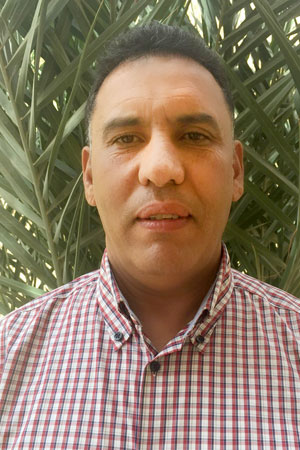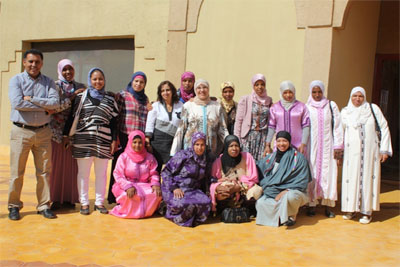Q&A: "Women's voices and the challenges they address must be key components of the adaptive responsive to a changing climate" —ecological expert
Date:

Brahim Jaafar, who holds a doctorate in ecology, is currently the national coordinator of UNDP's territorial development programme in the Tafilalet region and the Director of Territorial Planning in Morocco. He has more than 20 years' experience in project and programme management with national resources and sustainable development in Morocco. Mr. Jaafar speaks to UN Women about the importance of addressing climate change from a gender perspective.
Why should we address climate change from a gender perspective?
Climate change affects a number of sectors (water, agriculture, tourism, ecosystems, etc.) with negative consequences for the achievement of sustainable development goals. It is therefore vital that communities act to help reduce the effects of climate change and establish adaptation strategies.
In this context women are more exposed to the effects of climate change than men. Women react to these issues differently. It is therefore important to bear in mind these exposure inequalities and ensure that the effects of climate change do not exacerbate inequality between women and men.
Addressing climate change and the vulnerability of territories and communities must rely on planning that focuses on gender-aware multisectoral preventive approaches and requires the development of strategies that include consideration of the adaptation component. This must clearly place knowledge-sharing, training and awareness for citizens and vulnerable groups, particularly women, at the centre of its priorities.
Therefore, due to the interdisciplinary and multisectoral impact of climate change, wide-ranging research and development must be undertaken to improve understanding of the complex links between climate change, territories and societies. Systemic approaches that take into account gender must be encouraged and developed in the context of international cooperation that is to be maintained and reinforced.
What challenges have you encountered in your appeals regarding the role of women in the fight against climate change?

Our experience in the Tafilalet oasis programme and the programmes conducted jointly with UN Women in the oases of south-eastern Morocco has involved hard-working communities with local knowledge on how to adapt to climate change. However, women at the front-lines of implementing adaptation actions do not have access to land ownership or the decision-making power to carry out change. Illiteracy, which affects most women, does not help with independence, and requires development agents to make considerable efforts to achieve tangible results.
What gender-aware results to you expect to see in the global agreement to be reached in Paris?
As you know, the COP21 conference is taking place in France, and in 2016 Morocco will host COP22. One of the groups that believes it is vital to ensure that women's voices are heard during these major international conferences is R20. They have launched an initiative, a global campaign entitled "Women Leading Climate Action towards COP21", to demonstrate the power of women in the fight against climate change, and also to inspire and support actions led by women around the world.
All of us, men and women, must equally and effectively take part in this COP to appeal for the involvement of women in decision-making bodies on climate change. Women's voices, their responsibilities, their knowledge of the environment and the challenges they address must be key components of the adaptive responsive to a changing climate.
We hope to support and strengthen the current funding mechanisms dedicated to the legal and socioeconomic independence of women in developing countries, as well as to mobilize international organizations to promote the transfer of knowledge and technologies in favour of adaptation and reduction programmes for climate change, prioritizing vulnerable communities.
In terms of this transfer of technology, we hope to target employability and entrepreneurship among women and girls in green jobs and the green economy.